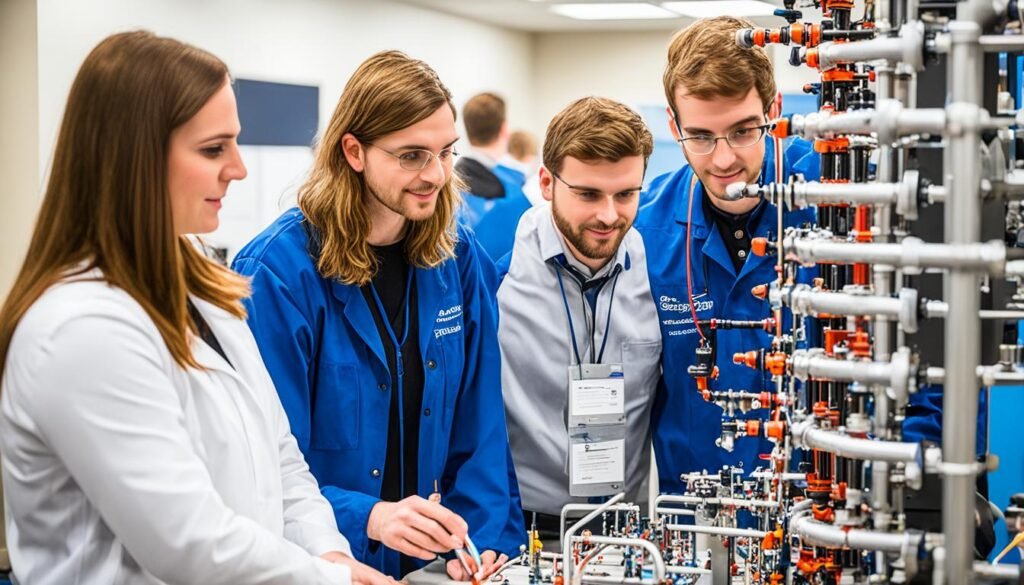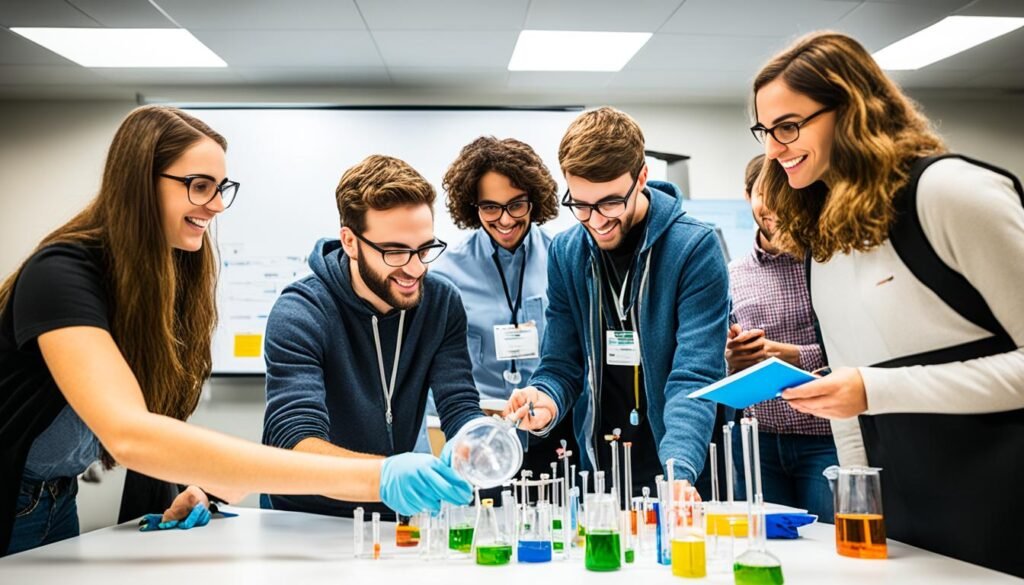Chemical Engineering Challenges is a dynamic field that holds immense potential, but it also presents a range of challenges. From advancing green chemistry to optimizing mass transfer and energy use, the chemical industry constantly seeks innovative solutions to overcome these obstacles. Embracing these challenges is crucial for the future of chemical engineering, as it evolves in tandem with the changing needs of society.
Key Takeaways:
- Chemical engineering faces challenges in areas such as green chemistry, mass transfer, and energy use.
- The chemical industry requires solutions to these challenges for its continued growth and relevance.
- Overcoming barriers in chemical engineering is crucial for a sustainable and prosperous future.
The Demand for Chemical Engineers in South Africa
In South Africa, the demand for chemical engineers is on the rise, driven by the growing needs of key industries such as the petrochemical, pharmaceutical, and energy sectors. Chemical engineers play a crucial role in designing and optimizing processes, developing new products, and ensuring operational efficiency.
The petrochemical industry in South Africa, one of the largest on the continent, relies heavily on chemical engineers to oversee the production of chemicals, plastics, and fuels. With abundant natural resources and the presence of major refineries, the country offers numerous opportunities for chemical engineers to contribute to this sector.
“Chemical engineers are vital in providing solutions that drive sustainable growth in the petrochemical industry. Their expertise in process optimization and innovation plays a significant role in ensuring efficient and environmentally friendly operations,” says Dr. Tumo Lekota, a senior chemical engineer at PetroCo, a leading South African petrochemical company.
The pharmaceutical industry also presents a strong demand for chemical engineers in South Africa. These professionals are responsible for developing and improving drug manufacturing processes, ensuring product quality and safety, and driving innovation in drug delivery systems. With the increasing focus on healthcare and ongoing research and development in the country, the demand for chemical engineers in the pharmaceutical sector continues to grow.
Moreover, the energy sector in South Africa, which encompasses traditional and renewable energy sources, heavily relies on chemical engineers to optimize energy production processes and find sustainable solutions. From power plants to renewable energy projects, chemical engineers contribute their expertise in areas such as energy conversion, environmental impact mitigation, and resource management.
“With the ongoing transition to clean energy sources, chemical engineers are crucial in developing sustainable solutions, such as novel materials and processes, to address the challenges faced by the energy sector,” emphasizes Dr. Zanele Mokoena, a senior chemical engineer at GreenPower, a leading renewable energy company.
Considering the steady growth in the chemical sector, chemical engineering graduates in South Africa have numerous career opportunities available to them. They can work in various industries, including petrochemicals, pharmaceuticals, energy, manufacturing, and consulting, offering them a diverse and dynamic career path.
The Role of Chemical Engineers in South Africa
Chemical engineers in South Africa are at the forefront of tackling complex challenges, driving innovation, and contributing to the country’s economic growth. Their expertise in process optimization, product development, and sustainability ensures the smooth operation of vital industries, making them indispensable contributors to the nation’s development.
Challenges Faced by Chemical Engineering Graduates
Despite the high demand for chemical engineers, graduates often encounter difficulties in finding suitable employment opportunities. One of the major challenges faced by these graduates is the scarcity of entry-level positions within the industry, which makes it harder for them to secure jobs or forces them to accept low-paying or temporary positions. Additionally, the skills acquired in chemical engineering may not be easily transferable to other fields, thus limiting the job prospects outside of the chemical industry.
With limited job opportunities, chemical engineering graduates need to find solutions to enhance their employability. This may involve gaining additional skills or exploring alternative career paths that align with their expertise. Understanding the challenges they face and developing strategies to overcome these obstacles is crucial for a successful career in chemical engineering.
“The shortage of entry-level positions in the chemical engineering industry poses challenges for graduates seeking employment, leading to limited job opportunities and a need for alternate career paths.”
Skills Transferability
One of the key challenges faced by chemical engineering graduates is the limited transferability of their skills to other industries. While the technical knowledge gained during their studies is highly specialized and valuable within the chemical industry, it may not always be directly applicable in other sectors. This constraint narrows down the job opportunities available to these graduates, making it essential for them to adapt their skills or seek additional training to broaden their career prospects.
The Lack of Entry-Level Positions
The scarcity of entry-level positions is a significant hurdle for chemical engineering graduates. As the industry evolves and demands experienced professionals, finding suitable entry-level roles becomes increasingly challenging. This shortage of entry-level positions forces many graduates to compete for limited opportunities, which can result in prolonged job searches or compromises in terms of salary or job stability.
To overcome this challenge, graduates can consider internships, co-op programs, or other forms of hands-on work experience in the chemical industry. This practical experience not only enhances their employability but also provides a platform to showcase their skills and build professional connections.
Exploring Alternative Career Paths
To expand their job prospects, chemical engineering graduates can explore alternative career paths that align with their skills and interests. While the traditional chemical industry may offer limited entry-level positions, other sectors such as renewable energy, water treatment, pharmaceuticals, and consulting firms may provide viable options.
By leveraging their problem-solving abilities, analytical skills, and technical expertise, chemical engineering graduates can identify industries and roles that value their unique skill set. Additionally, pursuing further education or specialized certifications in areas of high demand can further enhance their employability and open up new career opportunities outside of the chemical industry.
| Challenges Faced | Impact |
|---|---|
| Limited job opportunities | Difficulty in securing employment |
| Skills transferability | Restricts job prospects outside the chemical industry |
| Shortage of entry-level positions | Competition for limited job openings |

Strategies to Improve Employability of Chemical Engineering Graduates
Chemical engineering graduates in South Africa can enhance their employability by implementing various strategies. By pursuing further education and specialized training in specific areas of chemical engineering, graduates can develop a deeper understanding of industry trends and acquire the necessary knowledge and skills sought after by employers.
Work experience is another crucial aspect of improving employability. Graduates should seek opportunities to gain practical experience through internships or part-time positions in the chemical industry. This hands-on experience not only strengthens their resume but also allows them to apply theoretical knowledge in real-world scenarios.
Building a strong network is vital for chemical engineering graduates. Active involvement in professional organizations such as the South African Institute of Chemical Engineering (SAIChE) and participating in industry events provide valuable opportunities to connect with industry professionals, stay updated with technological advancements, and gain insights into the latest developments in the field.
Developing soft skills is equally important for employability. Effective communication, problem-solving, and leadership abilities are valued traits in the workplace. Graduates can enhance their soft skills through workshops, seminars, and extracurricular activities that promote personal development and well-roundedness.
By implementing these strategies, chemical engineering graduates can increase their chances of securing desirable positions and advancing their careers in the competitive job market.

Examples of Further Education and Specialized Training Programs
| Program | Institution | Description |
|---|---|---|
| Certification in Sustainable Engineering | University of Cape Town | This program focuses on integrating sustainability principles into engineering practices and equips graduates with the skills to address environmental challenges. |
| Master’s in Process Optimization | Stellenbosch University | Designed for chemical engineering graduates interested in process optimization, this program explores advanced techniques and technologies for improving operational efficiency. |
| Advanced Course in Petrochemical Engineering | University of Witwatersrand | This course provides in-depth knowledge of petrochemical processes, equiping graduates with specialized skills valued in the petrochemical industry. |
Quotes:
“Obtaining further education and specialized training can significantly enhance the employability of chemical engineering graduates. It demonstrates a commitment to continuous learning and keeps graduates up-to-date with the latest advancements in the field.” – Dr. Sarah Johnson, Chemical Engineering Professor at the University of Pretoria.
The Importance of Industry Connections for Chemical Engineering Graduates
Establishing industry connections is crucial for chemical engineering graduates. Building relationships with industry professionals can provide valuable job market insights and access to hidden job opportunities. By networking with professionals in the field, graduates can gain a better understanding of the current trends and demands within the industry.
Attending industry events and participating in professional organizations can be effective ways to expand one’s network and meet key players in the field. These events and organizations provide opportunities for networking, knowledge sharing, and mentorship. By engaging with industry professionals, graduates can gain valuable insights into the job market and develop connections that can enhance their employability prospects.
“Industry connections and networking have played a significant role in my career as a chemical engineer. Through professional organizations and networking events, I have been able to meet industry leaders, learn about job opportunities, and gain valuable insights into the industry. Building a strong network has not only opened doors for career advancement but has also provided a supportive community of like-minded professionals.”
Furthermore, reaching out to alumni who have established successful careers in chemical engineering can be a valuable source of guidance and mentorship. Alumni can provide firsthand knowledge and advice about navigating the job market and offer insights into their own career experiences.
In addition to job market insights, industry connections can also provide opportunities for collaboration on research projects or access to internships and co-op programs. These experiences can further enhance graduates’ skills and make them more competitive in the job market.
Overall, the importance of industry connections cannot be overstated for chemical engineering graduates. Networking with professionals, participating in industry events, and joining professional organizations can significantly enhance employability prospects and open doors to hidden job opportunities.
The Impact of Education on Engineering Accessibility for Young People
Education plays a significant role in making engineering more accessible to young people. By introducing STEAM subjects (Science, Technology, Engineering, Arts, and Mathematics) at schools, we can have a transformative impact on young minds.
STEAM subjects provide a well-rounded education that integrates key disciplines and encourages critical thinking, problem-solving, and creativity. By incorporating engineering principles into the curriculum, we can inspire young people to see the world through an engineering lens and spark their interest in pursuing careers in this field.
“Introducing engineering concepts early on helps young minds develop a solid foundation and explore their passion for problem-solving. By fostering curiosity and a love for learning, we can empower the next generation of engineers.”
Hands-on learning is crucial in cultivating engineering accessibility for young minds. By providing opportunities for students to participate in experiments, projects, and competitions, we can engage them in practical applications of engineering principles. This experiential approach not only deepens their understanding of engineering concepts but also ignites their passion for the field.

Benefits of STEAM Education in Engineering Accessibility
| Benefits | Explanation |
|---|---|
| Increased Engagement | STEAM subjects capture students’ interest by relating theoretical concepts to real-world applications, fostering active learning. |
| Enhanced Problem-Solving Skills | STEAM education nurtures critical thinking and problem-solving abilities, essential for engineering success. |
| Fostering Creativity | STEAM subjects encourage innovative thinking, enabling young minds to generate unique solutions. |
| Diverse Career Opportunities | STEAM education exposes students to various engineering disciplines, opening doors to a wide range of career paths. |
By emphasizing the importance of engineering accessibility and incorporating STEAM subjects into educational curricula, we can inspire the next generation of engineers. Through this holistic approach, we can empower young minds to overcome barriers and embrace the exciting world of engineering.
Overcoming Barriers in Engineering Education
Engineering education faces several barriers that hinder the progress of aspiring engineers. These barriers include bias, limited understanding of engineering concepts, and a lack of interest in the field, especially among girls and students from lower-income backgrounds.
Bias in engineering education can manifest in various ways. It may involve preconceived notions about which genders or socio-economic backgrounds are more suited for engineering. Overcoming such bias is essential to ensure equal opportunities for all students.
A limited understanding of engineering can discourage students from pursuing the field. It is important to provide comprehensive and accessible resources that simplify complex concepts, making engineering education more engaging and approachable.
Similarly, fostering interest in engineering is crucial in attracting more students to the field. By promoting awareness about the exciting possibilities and real-world impacts of engineering, we can ignite curiosity and cultivate a passion for the subject.
Efforts should be made to bridge the gender gap and create equal opportunities for all students.
To overcome these barriers, promoting awareness and providing resources are key. It is important to actively address gender disparities in engineering education and create an inclusive environment for all students. This can be achieved through initiatives that encourage girls to pursue engineering and challenge societal stereotypes.
Table: Programs and Initiatives Addressing Barriers in Engineering Education
| Program/Initiative | Description |
|---|---|
| STEM Outreach Programs | Engage students in hands-on engineering activities and showcase diverse role models to inspire interest in engineering. |
| Curriculum Enhancement | Develop and implement inclusive curricula that highlight the real-world applications of engineering and promote diverse perspectives. |
| Engineering Scholarships | Offer financial assistance to students from underrepresented backgrounds, ensuring access to quality education. |
| Mentorship Programs | Pair aspiring engineers with experienced professionals who can provide guidance, support, and career advice. |
By implementing these initiatives and creating a supportive ecosystem, we can inspire more young people, regardless of gender or socio-economic background, to pursue engineering education. Overcoming barriers and embracing diversity will lead to a stronger and more inclusive engineering community, driving innovation and addressing global challenges.

The Role of Non-Engineers in Driving Change in the Engineering Field
Non-engineers play a pivotal role in driving transformative change in the engineering field. By leveraging the collective expertise of both engineers and non-engineers, we can work collaboratively to address challenges and make a positive impact on the world through engineering.
Diverse perspectives are essential for driving innovation and finding holistic solutions. Non-engineers bring unique insights and skills that complement those of engineers, fostering creativity and out-of-the-box thinking. Their expertise in areas such as business, marketing, finance, and communication can be instrumental in translating engineering concepts into practical applications.
Through collaboration, non-engineers and engineers can form interdisciplinary teams that tackle complex problems from multiple angles. This collective expertise leads to more comprehensive and effective solutions that have a lasting positive impact on society.
“The collaboration between engineers and non-engineers is like a symphony, where each instrument plays a crucial role in creating beautiful music. Together, they have the power to create transformative change and shape the future of engineering.”
Furthermore, non-engineers often have a deep understanding of the needs and aspirations of end-users, providing valuable insights into the societal impact and feasibility of engineering projects. By involving non-engineers in the decision-making process, engineers can create solutions that align with the needs of the people they serve.
Whether it’s in project management, policy development, or community engagement, non-engineers contribute to the successful implementation of engineering initiatives. Their diverse skill sets and perspectives ensure that projects are not only technically sound but also socially responsible.
The Power of Collaboration
The collaboration between engineers and non-engineers is fueled by shared goals and a common vision for a better future. By working together, they can overcome barriers, challenge existing norms, and drive change that positively impacts society and the environment.
Case Study: Sustainable Energy Innovation
In the pursuit of sustainable energy solutions, non-engineers can play an integral role in driving innovation. Let’s consider a case study where a team of engineers and non-engineers collaborates to develop a sustainable energy project:
| Role | Responsibilities |
|---|---|
| Engineers | Design and optimize the energy system based on technical expertise |
| Non-Engineers | Conduct market research and feasibility studies |
| Engineers | Implement and manage the technical aspects of the project |
| Non-Engineers | Develop marketing strategies and engage with stakeholders |
| Engineers and Non-Engineers | Collaborate on project monitoring, evaluation, and continuous improvement |
This collaborative approach allows engineers and non-engineers to combine their expertise, ensuring that the sustainable energy project not only meets technical requirements but also aligns with market demand, regulatory frameworks, and stakeholders’ interests. The result is a project that is both technically sound and economically viable, leading to a widespread adoption of sustainable energy solutions.

Breaking Barriers in Underrepresented Communities in Engineering
Underrepresented communities, particularly women and those from low-income backgrounds, face unique barriers to accessing education and opportunities in engineering. These barriers can limit their ability to pursue careers in this field and contribute to the overall gender gap and lack of diversity in engineering.
One effective way to overcome these barriers is through mentorship programs. Mentorship provides support, guidance, and networking opportunities for aspiring engineers from underrepresented communities. By connecting aspiring engineers with experienced professionals in the field, mentorship programs empower individuals to navigate challenges and build successful careers in engineering.
Mentorship programs aimed at closing the gender gap in engineering are especially crucial. They provide female engineers with role models and mentors who can help them overcome societal biases and stereotypes, and develop the confidence and skills needed to thrive in the field.
“Mentorship is not just about giving advice, but also about sharing experiences and helping mentees overcome obstacles they may face. It creates a support system for underrepresented communities in engineering and serves as a stepping stone towards closing the gender gap in the industry.”
In addition to mentorship programs, creating inclusive environments and fostering diversity within engineering institutions and organizations is essential. This can be achieved through targeted recruitment efforts, scholarships, and resources that support access to education for underrepresented communities. By actively promoting diversity, we can break down the barriers that prevent individuals from pursuing engineering careers.
The Power of Mentorship Programs
Mentorship programs play a vital role in empowering aspiring engineers from underrepresented communities. Through these programs, mentees gain valuable insights, develop industry-specific skills, and build professional networks. Mentors provide guidance on career paths, offer advice on navigating challenges, and share their experiences to inspire and motivate mentees.
Moreover, mentorship programs contribute to the personal and professional growth of mentees. They provide opportunities for skill development, exposure to real-world engineering projects, and the chance to learn from the successes and failures of experienced professionals.
Mentorship programs also bring benefits to mentors themselves. Mentoring allows experienced engineers to give back to their communities and contribute to a more inclusive and diverse engineering industry. It enhances their leadership and communication skills while providing a fulfilling experience of helping others succeed.
Mentorship and Closing the Gender Gap
The gender gap in engineering can be addressed through mentorship programs that specifically target women and girls. By connecting female engineering students and professionals, these programs create a supportive environment that fosters growth and provides opportunities for women to thrive in a traditionally male-dominated field.
A study conducted by McGill University found that mentorship significantly increases the retention of women in engineering. It highlighted the positive impact of mentorship on gender diversity by empowering women to overcome barriers, build confidence, and envision successful careers in engineering.
Mentorship Programs in Action
One example of a successful mentorship program is the Society of Women Engineers (SWE) Collegiate Mentorship Program. This program pairs undergraduate students with professional mentors who guide them through their engineering journey. Through this mentorship program, SWE aims to increase the representation of women in engineering and provide a supportive network for aspiring engineers.
Another notable initiative is the Women in Engineering Mentor Program at the University of California, Berkeley. This program connects female engineering students with alumnae who serve as mentors. The mentors share their experiences, provide career advice, and support students in overcoming challenges and achieving their professional goals.
The Impact of Mentorship
Mentorship programs have a significant impact on underrepresented communities in engineering. By breaking down barriers and providing support, mentorship programs help aspiring engineers from these communities overcome challenges and achieve their goals. They empower individuals to pursue rewarding careers in engineering and contribute their unique perspectives to the field.
Through mentorship, we can create a more inclusive and diverse engineering industry that reflects the talent and capabilities of all individuals, regardless of their background. By fostering mentorship programs and closing the gender gap, we can ensure that underrepresented communities have equal access to opportunities and thrive in the field of engineering.
| Mentorship Benefits for Underrepresented Communities | Mentorship Impacts |
|---|---|
| Access to guidance from experienced professionals | Inspires and empowers individuals to pursue engineering careers |
| Networking opportunities within the engineering industry | Expands professional connections and opportunities |
| Overcoming unique barriers faced by underrepresented communities | Increases representation and diversity in engineering |
| Personal and professional growth through mentorship | Develops skills and fosters success in the engineering field |
The Power of Mentorship in Engineering
In the field of engineering, mentorship plays a crucial role in guiding aspiring engineers and providing them with valuable career guidance and opportunities. Through mentorship programs, experienced professionals have the chance to share their knowledge, help aspiring engineers navigate the challenges of the field, and inspire the next generation of engineers.
Mentorship is a powerful tool for personal and professional development in engineering. By connecting aspiring engineers with mentors, they gain access to industry insights, practical advice, and guidance on navigating the complex world of engineering. Mentors can provide career guidance, help mentees set goals, and offer valuable feedback and support throughout their journey.
Mentorship—guiding and supporting aspiring engineers—is a cornerstone of professional growth and development. It offers the opportunity for young minds to gain profound insights and learn from the experiences of those who have already paved the way. Through mentorship, engineers can take their careers to new heights and make a lasting impact on society.
In addition to career guidance, mentorship provides aspiring engineers with invaluable networking opportunities. Mentors often have well-established connections within the industry and can introduce mentees to influential professionals, potential employers, and other valuable resources. These connections can open doors to internships, job opportunities, collaborations, and further professional development.
Mentorship also helps engineers to build essential skills that are not taught in the classroom. By working closely with a mentor, aspiring engineers can develop their communication, problem-solving, and leadership abilities. These soft skills are highly sought after by employers and are crucial for success in the engineering field.
Benefits of Mentorship in Engineering:
- Access to industry insights and practical advice
- Career guidance and goal setting
- Networking opportunities
- Introduction to influential professionals and potential employers
- Opportunities for internships, collaborations, and job placements
- Development of essential soft skills
The impact of mentorship in engineering extends beyond the individual level. It contributes to a stronger engineering community by fostering knowledge transfer, collaboration, and the cultivation of future leaders. Through mentorship, experienced engineers impart their wisdom and leave a lasting legacy, ensuring a bright and promising future for the engineering profession.
If you are a young engineering professional or a student pursuing a career in engineering, seek out mentorship opportunities. Join mentorship programs, connect with industry professionals, and approach seasoned engineers who inspire you. The guidance and support you receive from a mentor can truly transform your engineering journey and set you on a path to success.
The Future of Chemical Engineering and the Importance of Sustainability
Sustainability is at the forefront of the future of chemical engineering, as the industry strives to find solutions to environmental challenges. Chemical engineers play a vital role in the development of sustainable energy sources, reducing the environmental impact of industrial processes, and conducting research projects that contribute to a greener and more sustainable future.
One of the key areas where chemical engineers are making a significant impact is in the development of sustainable energy. With the growing demand for clean and renewable energy sources, chemical engineers are at the forefront of designing and implementing innovative solutions. Through their expertise in areas such as biofuels, solar energy, and energy storage, they are driving the transition to a more sustainable energy future.
Furthermore, chemical engineers are actively working towards reducing the environmental impact of industrial processes. By developing more efficient and environmentally friendly production methods, they are helping industries minimize their carbon footprint and waste generation. Chemical engineers are also involved in research projects that focus on improving the sustainability of materials and products, finding alternative raw materials, and optimizing recycling processes.
“Sustainability is not just a buzzword; it is a fundamental principle that chemical engineers must embody in their work. By prioritizing sustainable practices in education and practice, we can create a greener and more sustainable future for generations to come.” – Dr. Catherine Johnson, Chemical Engineering Expert
Emphasizing sustainability in both chemical engineering education and practice is crucial for the continued growth and relevance of the field. This includes integrating sustainable principles into the curriculum, encouraging research projects that address environmental challenges, and promoting collaboration between academia, industry, and government to drive sustainable innovation.
The Role of Chemical Engineers in Environmental Impact Assessment
Environmental impact assessment is an essential aspect of chemical engineering. As professionals who understand the chemical processes involved in various industries, chemical engineers are well-equipped to assess and mitigate the environmental impacts of projects and processes. They apply their expertise to identify potential risks, develop sustainable alternatives, and ensure compliance with environmental regulations.
Chemical engineers also play a crucial role in advocating for sustainable practices within their organizations and industries. By raising awareness about the environmental impact of certain processes and proposing sustainable alternatives, they contribute to the overall reduction of environmental harm.
Also Read:- Empowering The Future: Exploring The Advances In Electrical Engineering Technology
Overall, the future of chemical engineering is intertwined with sustainability. As the world faces pressing environmental challenges, chemical engineers will continue to drive innovation, develop sustainable energy solutions, and reduce the environmental impact of industrial processes. By prioritizing sustainability in education and practice, we can create a thriving field that addresses global challenges while promoting a greener and more sustainable future.
Conclusion
Chemical engineering challenges can be overcome by implementing innovative solutions that address the evolving needs of the industry. By developing new technologies and processes, chemical engineers can find sustainable solutions to meet the demands of a changing world. Additionally, improving employability strategies and creating more accessible pathways into the field will help bridge the gap between graduates and industry opportunities.
Furthermore, a strong focus on sustainability is crucial for the future of chemical engineering. By incorporating sustainable practices and promoting environmentally friendly solutions, chemical engineers can contribute to a cleaner and greener future. The discipline of chemical engineering plays a critical role in shaping a sustainable and prosperous society.
In conclusion, chemical engineering is a dynamic field with immense potential. By addressing challenges, such as employability and accessibility, and emphasizing sustainability, we can ensure the continued growth and relevance of the discipline. The next generation of chemical engineers holds the key to solving pressing global issues and driving positive change. Together, we can build a thriving and impactful field that propels us towards a sustainable future.
FAQs
Q: What is the focus of chemical engineering challenges?
A: Chemical engineering challenges focus on the intersection of chemical science, engineering, and life sciences to develop new solutions and approaches.
Q: How does chemical engineering address new challenges, including climate change?
A: Chemical engineering applies a broad range of principles and practices to tackle new challenges, such as climate change, by developing sustainable solutions.
Q: What is the role of predictive reaction engineering in chemical engineering?
A: Predictive reaction engineering is essential in chemical engineering as it helps adjust the rate of reactants and predict outcomes accurately.
Q: How does chemical engineering contribute to the development of new pathways in chemistry?
A: Chemical engineering plays a crucial role in the development of new chemical pathways that enable the creation of innovative products and processes.
Q: What is the significance of chemical thermodynamics in the field of chemical engineering?
A: Chemical thermodynamics is fundamental in chemical engineering as it helps in understanding and predicting the behavior of chemical systems under different conditions.
Q: How does chemical engineering support advancements in the heavy chemical industry?
A: Chemical engineering provides expertise and innovations that drive advancements in the heavy chemical industry, leading to improved processes and products existing and new.
Q: What is the purpose of the National Academies in the realm of chemical engineering?
A: The National Academies play a crucial role in promoting and advancing science and engineering, including in the field of chemical engineering.
Source Links
- https://www.linkedin.com/pulse/breaking-barriers-maximizing-employability-chemical-graduates-ntuli
- https://www.linkedin.com/pulse/breaking-barriers-building-engineers-importance-steam-helen-ling?trk=article-ssr-frontend-pulse_more-articles_related-content-card
- https://manhattan.edu/news/archive/2023/02/dominique-whyte.php

